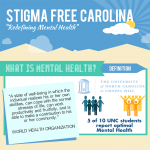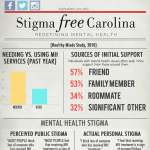About Stigma Free Carolina
What is Stigma Free Carolina?
Stigma Free Carolina is a UNC community campaign, initially conceived by members of the Royster Society of Fellows, aimed at reducing stigma toward mental health concerns and treatment. By accurately defining mental health, educating the community, and dispelling negative or false beliefs about mental health and its treatment we can help everyone be their best selves and reach their full potential.
Who are the Supporting Partners?
We express sincere gratitude to members of the following organizations for providing significant support:
- Carolina Dining Services
- Counseling and Psychological Services
- Graduate and Professional Student Federation
- Housing and Residential Education
- Interactive Theatre Carolina
- Office of Academic Advising
- Office of Faculty Governance
- Office of Student Affairs
- Office of the Dean of Students
- Office of Undergraduate Admissions
- School of Allied Health Sciences
- Gillings School of Global Public Health
- School of Social Work
- The Graduate School
- The Royster Society of Fellows
- UNC Student Stores
- Student Body Government
- Student Wellness
- Club Nova
- Cracked Windows Studios
- Active Minds at Carolina
- NAMI – UNC
- Embody Carolina
- Rethink Psychiatric Illness
What is Mental Health?
The U.S. Centers for Disease Control and Prevention defines mental health as, “a state of well-being in which the individual realizes his or her own abilities, can cope with the normal stresses of life, can work productively and fruitfully, and is able to make a contribution to his or her community.”
Mental Health:
• is an important part of general health; one cannot be healthy without mental health.
• is more than the absence of mental disorders or disabilities.
• includes positive emotions and negative emotions; good days and bad days.
What is Mental Health Stigma?
Personal mental health stigma occurs when one holds negative or stereotypical views toward those who experience mental health concerns. Perceived public mental health stigma occurs when one believes others in their environment hold negative or stereotypical views toward those who experience mental health concerns.
Does Mental Health Stigma Exist in the UNC Community?
Personal Stigma
- 11.3% of UNC students agree with the statement, “I would think less of someone who has received mental health treatment.”
- 19% of UNC students agree with the statement, “I feel that receiving mental health treatment is a sign of personal failure.”
Perceived Public Stigma
- 54.4% of UNC students agree with the statement,
“Most people would think less of someone who has received mental health treatment.” - 56% of UNC students agree with the statement,
“Most people feel that receiving mental health treatment is a sign of personal failure.”
Source: Eisenberg, D. (2010). HMS 2010 School Report Prepared for: University of North Carolina at Chapel Hill. Healthy Minds Study.



One Response to “About Stigma Free Carolina”
Mental Illness Awareness Week | HealthyHeels
[…] the stigma surrounding mental illness is one of the main objectives of MIAW. According to a study done among students at UNC, 11.3% of Carolina students surveyed said they agreed with the following statement: I would think […]